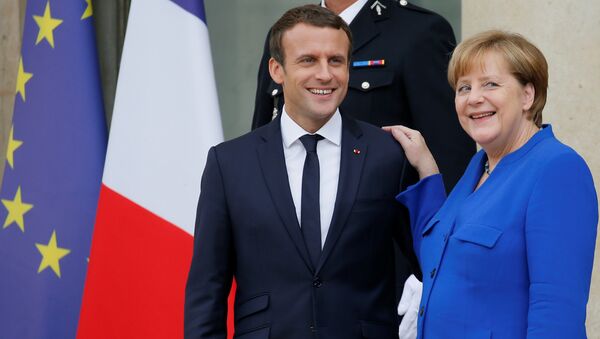On the 55th anniversary of the Élysée Treaty of friendship and cooperation, French President Emmanuel Macron and German Chancellor Angela Merkel pledged to enhance bilateral ties.
"Our ambition is to define common positions on all important European and international issues," a joint statement read.
It added that the two nations "will study and jointly propose effective policies and new technological approaches, particularly in the areas of climate protection, energy, mobility, biotechnology and artificial intelligence."
France and Germany have been at the core of the European Union, along with the United Kingdom, rising in unison to meet the challenges facing the EU. With Britain’s decision to withdraw from the association, the Franco-German locomotive will be left with no other choice but to further deepen cooperation.
Currently, the union is confronted with a host of pressing issues, including the ongoing refugee crisis and a growing terrorist threat. It appears that tackling these challenges has prompted a stronger bond of cooperation between the two countries.
READ MORE: Macron Pledges to Modernize France's Nuclear Deterrent Forces
The Franco-German alliance seems to be of strategic value for Germany’s interests in shaping the EU, as France has in many cases been an indispensable partner.
Paris had already come a long way before it accepted Berlin’s plan for European refugee quotas, which, however, was regarded by Germany as a move made in the collective European interest, rather than as an advancement in bilateral relations.
Following the deadly attacks in Paris in November 2015, Germany has shown solidarity with France, taking the decision to deploy troops to “support France, Iraq and the international alliance in their fights against Daesh (ISIS).” It seems to be that if Germany, after urging for solidarity in the relocation of refugees and funding for instruments of EU border control, would not have responded in an appropriately supportive way to France’s appeal, it would have harmed itself in the process.
READ MORE: Macron Calls for French-UK Approach to Settle Issue of Calais Child Refugees
In the context of Brexit negotiations France and Germany have managed to remain united, however, they may want to act against the centrifugal force that could affect the union, and be sure to enhance their cooperation within the European Union.
During the Ukraine crisis in 2014, Merkel and then-President Francois Hollande became part of the Minsk peace process, with an eye to broker an agreement between Russia and Ukraine; Paris and Berlin have also cooperated closely on resolving the Greek debt crisis, despite conflicting preferences in the situation.
Paris and Berlin "will explore ways to more effectively promote common France-Germany interests and values, particularly within the framework of common administrative and diplomatic mechanisms, in multilateral institutions… within and outside the European Union," the Macron-Merkel statement concluded.


